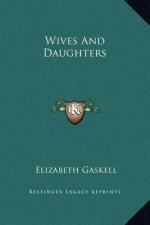Beyond direct professional instruction, he did not know what to do with the succession of pairs of young men, whose mission seemed to be to plague their master consciously, and to plague him unconsciously. Once or twice Mr. Gibson had declined taking a fresh pupil, in the hopes of shaking himself free from the incubus, but his reputation as a clever surgeon had spread so rapidly that fees which he had thought prohibitory, were willingly paid, in order that the young man might make a start in life, with the prestige of having been a pupil of Gibson of Hollingford. But as Molly grew to be a little girl instead of a child, when she was about eight years old, her father perceived the awkwardness of her having her breakfasts and dinners so often alone with the pupils, without his uncertain presence. To do away with this evil, more than for the actual instruction she could give, he engaged a respectable woman, the daughter of a shopkeeper in the town, who had left a destitute family, to come every morning before breakfast, and to stay with Molly till he came home at night; or, if he was detained, until the child’s bedtime.
‘Now, Miss Eyre,’ said he, summing up his instructions the day before she entered upon her office, ’remember this: you are to make good tea for the young men, and see that they have their meals comfortably, and—you are five-and-thirty, I think you said?—try and make them talk,—rationally, I am afraid is beyond your or anybody’s power; but make them talk without stammering or giggling. Don’t teach Molly too much: she must sew, and read, and write, and do her sums; but I want to keep her a child, and if I find more learning desirable for her, I’ll see about giving it to her myself. After all, I am not sure that reading or writing is necessary. Many a good woman gets married with only a cross instead of her name; it’s rather a diluting of mother-wit, to my fancy; but, however we must yield to the prejudices of society, Miss Eyre, and so you may teach the child to read.’




